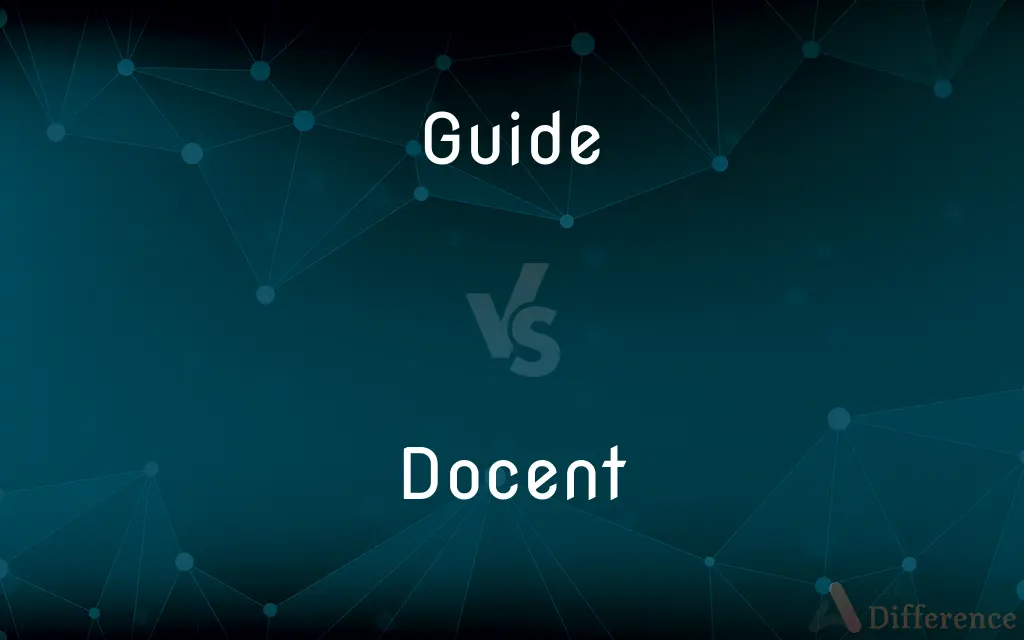Guide vs. Docent — What's the Difference?
Edited by Tayyaba Rehman — By Maham Liaqat — Updated on April 6, 2024
A guide directs or leads tours, often in various settings, while a docent specializes in providing educational tours, typically in museums or academic settings.

Difference Between Guide and Docent
Table of Contents
ADVERTISEMENT
Key Differences
A guide is someone who leads or directs a tour, offering general or specific information about the tour's location, such as historical sites, nature trails, or cities. They are versatile, working in a variety of settings and catering to a wide audience. On the other hand, a docent is often found in museums, galleries, or educational settings, specializing in offering in-depth knowledge about the exhibits, artifacts, or art on display. Docents are usually volunteers or experts in the field, providing detailed explanations to enhance visitors' understanding.
While guides may offer their services in a broad range of environments—from outdoor adventures to urban explorations docents are more likely to be associated with a specific institution, such as a museum or educational institution. This specialization allows docents to provide a more educational perspective, often backed by extensive training in their subject matter. Guides, however, may not always have formal education in the areas they cover but possess strong communication skills and the ability to engage with their audience effectively.
In terms of training, guides often undergo a certification process that covers general skills in tourism and customer service, along with specific knowledge about their tour area. Docents, whereas, may receive specialized training provided by the institutions they serve, focusing on pedagogical methods, deep knowledge of the subject matter, and sometimes even research skills to better answer visitors' questions.
The roles of guides and docents also differ in terms of interaction with the audience. A guide's primary role is to navigate and provide interesting facts or stories to entertain and inform the tour group. In contrast, a docent aims to educate and provoke thought, encouraging visitors to engage deeply with the material or exhibits, often facilitating discussions and answering complex questions.
Understanding the difference between a guide and a docent is essential for those seeking to enhance their experience in educational or touristic settings. Whether seeking broad information and an enjoyable tour experience or looking for in-depth educational insights, choosing the right type of expert can significantly impact one's understanding and enjoyment of the subject matter.
ADVERTISEMENT
Comparison Chart
Primary Role
Leads or directs tours
Provides educational tours
Setting
Various, including outdoor and urban
Museums, galleries, educational settings
Focus
General information, entertainment
In-depth knowledge, education
Background
May vary, often includes certification
Often volunteers, experts, with specialized training
Interaction
Engages with a wide audience
Encourages deep engagement, discussion
Compare with Definitions
Guide
A person who leads tours, offering information about places.
The guide led us through the ancient city, narrating its history.
Docent
Someone who encourages visitor engagement with exhibits.
The docent led a discussion on the scientific principles behind the exhibit.
Guide
Someone who directs the path or course of others.
As a mountain guide, he ensures the safety of climbers.
Docent
A volunteer or expert who provides educational tours in a museum.
The docent explained the significance of the ancient artifacts.
Guide
A professional who provides insights during travel.
Our tour guide in Paris was incredibly knowledgeable about the art history.
Docent
An educator in an academic setting who helps students understand subjects deeply.
The docent in the university's botanical garden explained plant species' adaptation strategies.
Guide
An individual who helps others navigate areas.
The wildlife guide pointed out various animal tracks.
Docent
An individual who educates visitors about art in galleries.
Our docent at the art gallery offered fascinating insights into modern art.
Guide
Someone who facilitates exploration or adventure.
The river guide prepared us for the rapids ahead.
Docent
A person skilled in delivering detailed information about exhibits.
The museum's docent had a deep knowledge of Egyptian history.
Guide
A guide is a person who leads travelers, sportsmen, or tourists through unknown or unfamiliar locations. The term can also be applied to a person who leads others to more abstract goals such as knowledge or wisdom.
Docent
Docent is a title at some European universities to denote a specific academic appointment within a set structure of academic ranks at or below the full professor rank, similar to a British readership, a French "maître de conférences" (MCF) and equal or above the title of "associate professor".
Guide
One who shows the way by leading, directing, or advising.
Docent
A teacher or lecturer at some universities who is not a regular faculty member.
Guide
One who serves as a model for others, as in a course of conduct.
Docent
A lecturer or tour guide in a museum or cathedral.
Guide
A person employed to conduct others, as through a museum, and give information about points of interest encountered.
Docent
Instructive; that teaches.
Guide
Something, such as a pamphlet, that offers basic information or instruction
A shopper's guide.
Docent
A teacher or lecturer at some universities (in central Europe, etc.)
Guide
A guidebook.
Docent
A tour guide at a museum, art gallery, historical site, etc.
The docent greeted the visitors and welcomed them to the Smithsonian.
Guide
Something that serves to direct or indicate.
Docent
Serving to instruct; teaching.
Guide
A device, such as a ruler, tab, or bar, that serves as an indicator or acts to regulate a motion or operation.
Docent
A teacher at some universities
Guide
A soldier stationed at the right or left of a column of marchers to control alignment, show direction, or mark the point of pivot.
Guide
To serve as a guide for; conduct.
Guide
To direct the course of; steer
Guide a ship through a channel.
Guide
To exert control or influence over; direct
Guided the nation through the crisis.
Guide
To supervise the training or education of.
Guide
To serve as a guide.
Guide
Someone who guides, especially someone hired to show people around a place or an institution and offer information and explanation, or to lead them through dangerous terrain.
The guide led us around the museum and explained the exhibits.
Guide
A document or book that offers information or instruction; guidebook.
Guide
A sign that guides people; guidepost.
Guide
Any marking or object that catches the eye to provide quick reference.
Guide
A device that guides part of a machine, or guides motion or action.
Guide
A blade or channel for directing the flow of water to the buckets in a water wheel.
Guide
A grooved director for a probe or knife in surgery.
Guide
A strip or device to direct the compositor's eye to the line of copy being set.
Guide
(occult) A spirit believed to speak through a medium.
Guide
(military) A member of a group marching in formation who sets the pattern of movement or alignment for the rest.
Guide
To serve as a guide for someone or something; to lead or direct in a way; to conduct in a course or path.
Guide
To steer or navigate, especially a ship or as a pilot.
Guide
To exert control or influence over someone or something.
Guide
To supervise the education or training of someone.
Guide
(intransitive) to act as a guide.
Guide
To lead or direct in a way; to conduct in a course or path; to pilot; as, to guide a traveler.
I wish . . . you 'ld guide me to your sovereign's court.
Guide
To regulate and manage; to direct; to order; to superintend the training or education of; to instruct and influence intellectually or morally; to train.
He will guide his affairs with discretion.
The meek will he guide in judgment.
Guide
A person who leads or directs another in his way or course, as in a strange land; one who exhibits points of interest to strangers; a conductor; also, that which guides; a guidebook.
Guide
One who, or that which, directs another in his conduct or course of life; a director; a regulator.
He will be our guide, even unto death.
Guide
Any contrivance, especially one having a directing edge, surface, or channel, for giving direction to the motion of anything, as water, an instrument, or part of a machine, or for directing the hand or eye, as of an operator
Guide
A noncommissioned officer or soldier placed on the directing flank of each subdivision of a column of troops, or at the end of a line, to mark the pivots, formations, marches, and alignments in tactics.
Guide
Someone employed to conduct others
Guide
Someone who shows the way by leading or advising
Guide
Something that offers basic information or instruction
Guide
A model or standard for making comparisons
Guide
Someone who can find paths through unexplored territory
Guide
Direct the course; determine the direction of travelling
Guide
Take somebody somewhere;
We lead him to our chief
Can you take me to the main entrance?
He conducted us to the palace
Guide
Be a guiding force, as with directions or advice;
The teacher steered the gifted students towards the more challenging courses
Guide
Use as a guide;
They had the lights to guide on
Guide
Guide or pass over something;
He ran his eyes over her body
She ran her fingers along the carved figurine
He drew her hair through his fingers
Common Curiosities
Can guides work in museums like docents?
Guides can work in museums but typically focus on general tours, while docents provide more educational and in-depth insights into exhibits.
What is a guide?
A guide is someone who leads or directs tours, providing information and insights about various locations or topics.
How does the role of a guide differ from a docent?
Guides offer a broad range of information and focus on navigation and entertainment, while docents specialize in educational content within specific institutions.
What makes a docent different from a regular teacher?
Docents are similar to teachers but are usually volunteers or experts in a particular field, providing educational experiences in non-traditional settings like museums.
What does a docent do?
A docent provides educational tours, mainly in museums or galleries, offering in-depth knowledge and encouraging engagement with the subject matter.
Do you need special training to be a docent?
Yes, docents often undergo specialized training provided by the institutions they serve, focusing on educational methods and deep knowledge of their subject matter.
What motivates individuals to become docents?
A passion for education, love for the subject matter, and the desire to share knowledge with others motivate individuals to become docents.
Can anyone become a guide?
While many can become guides, most undergo certification processes that cover tourism, customer service, and knowledge about their tour areas.
What skills are important for a guide?
Important skills for a guide include strong communication, customer service, and the ability to engage and entertain a diverse audience.
How can one become a docent?
Becoming a docent usually involves applying to a volunteer program at a museum or educational institution and completing their specialized training program.
Can guides provide tours in multiple languages?
Yes, multi-lingual guides can offer tours in several languages, catering to a broader audience.
Do docents need to have a background in education?
Not necessarily, but a strong interest in education and the subject matter they will be teaching is essential for docents.
Is being a docent a paid position?
Docents are typically volunteers, though some institutions may offer stipends or honorariums for their services.
Are guides always locals?
While many guides are locals, offering insights into their area, it's not a strict requirement. Passion and knowledge about the location are key.
How do guides and docents enhance the visitor experience?
Both guides and docents enhance the visitor experience by providing information, facilitating engagement, and making the subject matter more accessible and enjoyable.
Share Your Discovery

Previous Comparison
Tool vs. Equipment
Next Comparison
Faulter vs. FaultAuthor Spotlight
Written by
Maham LiaqatEdited by
Tayyaba RehmanTayyaba Rehman is a distinguished writer, currently serving as a primary contributor to askdifference.com. As a researcher in semantics and etymology, Tayyaba's passion for the complexity of languages and their distinctions has found a perfect home on the platform. Tayyaba delves into the intricacies of language, distinguishing between commonly confused words and phrases, thereby providing clarity for readers worldwide.
















































